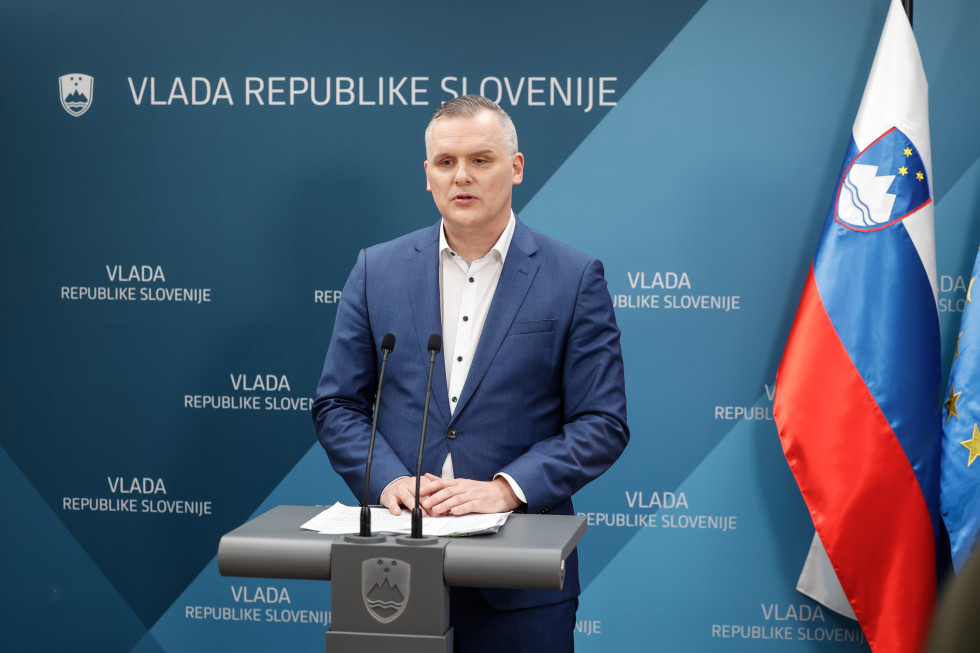37th Regular Session of the Government of the Republic of Slovenia

Bojan Kumer, Minister of the Environment, Climate and Energy | Author Nebojša Tejić/STA
The key objective of the draft Infrastructure for Alternative Fuels and the Promotion of the Transition to Alternative Fuels in Transport Act is to establish a dense publicly accessible network of refuelling and supply infrastructure for alternative fuels in transport that is interoperable, safe, available, accessible and easy to use. Thereby, we aim to ensure a coherent national, regional and local development of the network of refuelling and supply points and ultimately increase the proportion of alternative fuel vehicles.
The draft Introduction of Installations for the Production of Electricity from Renewable Energy Sources Act focuses primarily on the deployment of photovoltaic (solar power plants) and wind generation installations. The draft Act regulates the requirement to establish priority siting areas for RES and sets out certain specificities for siting in these areas and the specificities of spatial planning, comprehensive and environmental impact assessments and their installation. The Act also regulates, under strict conditions, the siting of these installations in certain areas where there is unexploited potential, as the provisions of sectoral legislation prevent such siting, often due to the consideration of large traditional energy installations.
The Government adopted a draft amendment to the Macro-prudential Supervision of the Financial System Act, which constitutes the basis for a change in the implementation of macro-prudential measures for credit to the population. The amended Act makes it clearer that the Bank of Slovenia is not bound by the provisions of the regulations on enforcement and insurance when exercising macro-prudential supervision. In fact, the Bank of Slovenia has so far interpreted the legal bases in such a way that it was bound by the restrictions set out in these regulations when issuing macro-prudential measures related to the restriction of credit to the population. The proposed amendment will thus unambiguously enable the Bank of Slovenia to implement macro-prudential measures for credit to the population in such a way that they will not be influenced by each adjustment of the minimum wage, but only by an independent assessment by the regulator.
The Government approved investments to improve the water supply of Slovenian Istria and the Karst hinterland by including the project "Drinking water supply to the Rižana and Karst networks" in the 2023-2026 Development Programme Plan. The supply of drinking water to the population of Slovenian Istria and the Karst hinterland is among the priorities in the implementation programme of national infrastructure projects due to the importance, complexity and difficulty of the issue. The purpose of the investment is to jointly prepare and implement urgent investment works on the inter-municipal or regional water supply network in the area of nine municipalities managed by the Rižanski vodovod Koper and Kraški vodovod Sežana. The main objectives of the planned investment are the possibility to supply additional volumes of water from the Kraški vodovod Sežana, the possibility to supply additional volumes of water from the Trieste water supply network and from the water source of Sv. Ivan, the possibility of more stable water production at the Gabrijeli waterworks, ensuring a quality and uninterrupted supply of drinking water, and increasing the safety of the drinking water supply from the aspect of consumption, the environment and the well-being of users.
By amending the Decree on self-employed professionals in culture, the Ministry of Culture now also allows, by reducing the scope of work criteria, those self-employed cultural professionals who demonstrate exceptional performance but have been forced to limit their scope of work due to the epidemic to meet the entry threshold for obtaining or exercising the right to receive paid social security contributions. Thus, the long-term negative consequences of the COVID-19 epidemic are finally being eliminated for the self-employed in the cultural sector as well. Another key change brought about by the new Decree is the level of the income threshold for the self-employed in the cultural sector. Until now, the gross salary from the 35th salary bracket was used as the basis for setting the census. In line with the increased rate of inflation and the rising cost of living over the last 10 months, as well as the increase in public sector salaries, the census is now set at salary bracket 36. The change in the salary bracket is also justified by the fact that the salary bracket was already set too low in the starting point, when the Decree entered into force, in relation to the qualifications required.
The Government appointed Helga Dobrin as State Secretary of the Ministry of the Interior with effect from 24 February 2023. At the same time, it appointed Senad Jušić as Acting Director-General of the Police, as from 24 February 2023 until the appointment of a new Director-General, but for a maximum period of six months, i.e. until 23 August 2023 at the latest.

